Oregon Is Now The Only Remaining State With Old Jim Crow Jury System
Congratulations to Louisiana, which isn't the last horse in this race.
 One wouldn’t expect normally forward-thinking Oregon to be the last vestige of a particularly odious legal convention, but after last night’s elections, that’s where it sits. Louisiana voters resoundingly passed Amendment 2, eliminating the state’s acceptance of non-unanimous felony verdicts and leaving Oregon as the sole remaining state with this stain on the books.
One wouldn’t expect normally forward-thinking Oregon to be the last vestige of a particularly odious legal convention, but after last night’s elections, that’s where it sits. Louisiana voters resoundingly passed Amendment 2, eliminating the state’s acceptance of non-unanimous felony verdicts and leaving Oregon as the sole remaining state with this stain on the books.
The Louisiana measure passed with over 64 percent of the vote, a hefty total until you realize the law enjoyed bipartisan support with endorsements from the Southern Poverty Law Center and the Lousiana Republican Party. Unfortunately, law enforcement officials up to and including the state’s attorney general put up a fight against eliminating the law and managed to bring about a third of voters with them to keep a system around that allows people to be convicted of a felony even when two jurors vote to acquit. No wonder Louisiana has the second-highest incarceration rate in the country.
These laws are byproducts of the Jim Crow era, designed to minimize the impact of minorities who might find their way onto a jury. In Louisiana, this unequivocally meant suppressing the influence of African American jurors. In Oregon, a state that actually banned black people from moving there until 1926, the jury rule focused more on non-Northern European immigrants from across the Atlantic. As the newspaper The Oregonian put it when Oregon passed its version of the law in the 1930s, “The increased urbanization of American life and the vast immigration into America from southern and eastern Europe, of people untrained in the jury system, have combined to make the jury of twelve increasingly unwieldy and unsatisfactory.”

Navigating Financial Success by Avoiding Common Pitfalls and Maximizing Firm Performance
Amazingly — or perhaps, sadly, not amazingly — the Supreme Court has upheld these non-unanimous systems. After indicating in Duncan v. Louisiana (1968) that the Sixth Amendment required unanimity, the Court stepped back in Apodaca v. Oregon (1972) and Johnson v. Louisiana (1972) to allow the states to continue railroading people into prison over the reasonable doubts of their peers.
But yesterday, finally, Louisiana turned the page and put an end to this nonsense. It’s time for Oregon to do the same.
 Joe Patrice is a senior editor at Above the Law and co-host of Thinking Like A Lawyer. Feel free to email any tips, questions, or comments. Follow him on Twitter if you’re interested in law, politics, and a healthy dose of college sports news.
Joe Patrice is a senior editor at Above the Law and co-host of Thinking Like A Lawyer. Feel free to email any tips, questions, or comments. Follow him on Twitter if you’re interested in law, politics, and a healthy dose of college sports news.
Sponsored

The Business Case For AI At Your Law Firm


Legal AI: 3 Steps Law Firms Should Take Now

Is The Future Of Law Distributed? Lessons From The Tech Adoption Curve

Early Adopters Of Legal AI Gaining Competitive Edge In Marketplace

Navigating Financial Success by Avoiding Common Pitfalls and Maximizing Firm Performance








